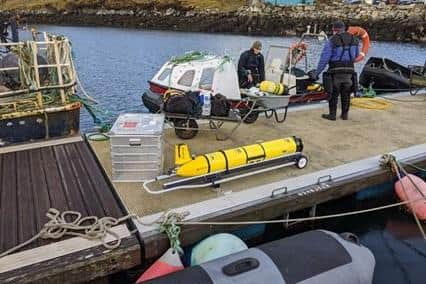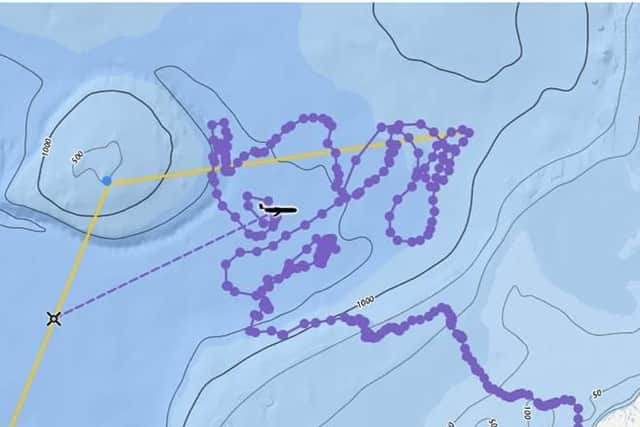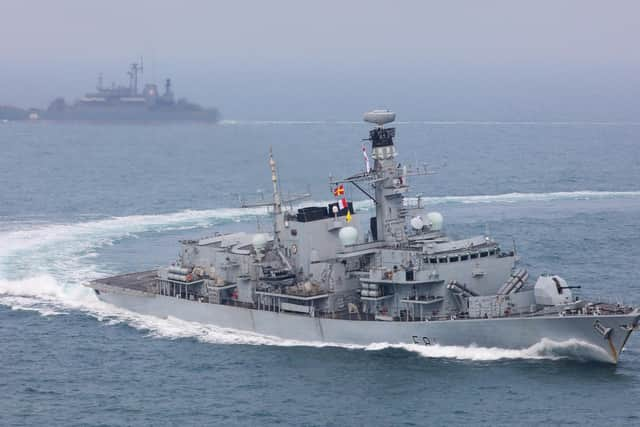Royal Navy tests hi-tech underwater gliders capable of revealing 'hiding places' of deadly Russian submarines
and live on Freeview channel 276
The sophisticated unmanned vehicle can dive to depths of 1,000m and reveal critical data about the ocean, helping to lift the veil on natural hiding places used by stealth boats.
The news comes amid a worrying surge of Russian submarine activity in the Atlantic, which has prompted concerns from British naval top brass.
Advertisement
Hide AdAdvertisement
Hide AdVice Admiral Jerry Kyd, former captain of Britain’s £3.1bn aircraft carrier HMS Queen Elizabeth, previously described the increase as both ‘frightening’ and ‘eye-watering’.


Four Royal Navy frigates were deployed to shadow an ‘unusually high’ number of Russian warships sailing through British waters at the end of March, with seven ships being monitored.
The Senior Service is now putting the Slocum Gliders through their paces during a five-month trial period off the west coast of Scotland.
Using its array of cutting-edge sensors, the tech is capable of hoovering up data from the ocean and is capable of sending near real-time information on temperature, depth, the water’s salt content or salinity, currents, oxygen levels, turbulence and more.
Advertisement
Hide AdAdvertisement
Hide AdKnowing this data can help improve the effectiveness of the navy’s sub-hunting specialists, from Type 23 frigates to Merlin and Wildcat helicopters – as well as the Royal Air Force’s P-8 Poseidon – during submarine hunting operations.


Results can give a better understanding about water column properties, revealing how enemies might exploit the environment to ‘hide’ in underwater features, such as ocean fronts and eddies.
Currently, collecting this data can take months but the gliders will be able to provide this information in a matter of hours, helping sub-hunters adapt to detect underwater threats.
‘Ocean environments are changing – what we knew 20 or 30 years ago doesn’t apply now in many areas, particularly the north Atlantic which is our backyard for submarine operations and probably one of the most complicated and challenging bodies of ocean,’ said Captain Pat Mowatt.


Advertisement
Hide AdAdvertisement
Hide Ad‘Salinity, sound velocity and temperature have all changed. We need to know these accurately as we strive to understand more and more about the undersea environment and how this affects the performance of ship and submarine sensors so we can achieve an operational advantage.’
The way sound travels through water is greatly affected by the water temperature, pressure and salinity, which impacts the effectiveness of sonar and sensors used by ships and aircraft to track submarines.
The data collected is being integrated into ocean forecast models by the Met Office and is available for use by the navy at the Joint Operational Meteorology and Oceanography Centre at Northwood.
It’s hoped if the trials are successful, the gliders will be deployed to high-threat areas to give a clearer picture of the dangers lurking underwater.
A message from the Editor
Thank you for reading this story on portsmouth.co.uk. While I have your attention, I also have an important request to make of you.
With the coronavirus lockdown having a major impact on many of our advertisers - and consequently the revenue we receive - we are more reliant than ever on you taking out a digital subscription.
Subscribe to portsmouth.co.uk and enjoy unlimited access to local news and information online and on our app. With a digital subscription, you can read more than 5 articles, see fewer ads, enjoy faster load times, and get access to exclusive newsletters and content. Visit our Subscription page now to sign up.
Our journalism costs money and we rely on advertising, print and digital revenues to help to support them. By supporting us, we are able to support you in providing trusted, fact-checked content for this website.
Comment Guidelines
National World encourages reader discussion on our stories. User feedback, insights and back-and-forth exchanges add a rich layer of context to reporting. Please review our Community Guidelines before commenting.